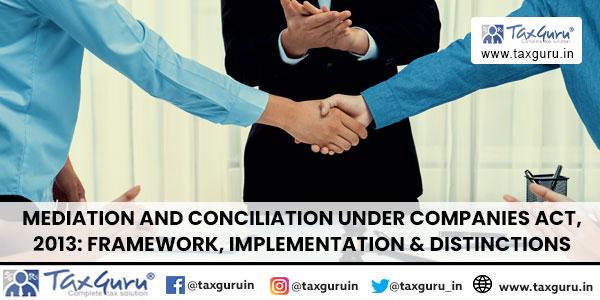Introduction
In the Companies Act, 2013[1], the concept of ADR mechanism is incorporated through Section 442[2]. Implementation of this section follows the Companies (Mediation and Conciliation) Rules 2016[3] promulgated on the 9th of September 2016. These rules provide a framework for addressing disputes between a company and another person in accordance with Section 15 of the Act through the use of Mediators/ Conciliators appointed from the Mediation and Conciliation Panel appointed by the Central Government. This mechanism makes it possible to solve disputes using a more efficient and affordable method compared to civil proceedings and highlights the difference between it and civil proceedings by examining the issues concerning specific statutory rights and relations stipulated by the Companies Act, 2013.
Mediation and Conciliation under the Companies Act, 2013: Understanding the Framework and Its Distinctions
The Companies Act, 2013[4] specifically in section 442[5] has laid down the provisions related to mediation as one of the methods of the ADR mechanism under the Companies Act, 2013. The execution of this section is done through the Companies (Mediation and Conciliation) Rules 2016, announced on 9th September, 2016.
There exist separate rules for High Courts of fifty states where civil courts directly can refer the parties to arbitration and/or mediation or Conciliation mostly in accordance with the provisions in the Civil procedure Code, 1908[6]. These rules, however, apply to civil matters only and the receive no recognition for their criminal counterparts.
The CA 2013 still retains a key feature where the mediator/ conciliator is to make recommendation to the administrator/tribunal once he/she completes the mediation process. However, there are issues that may arise regarding the options that come with this kind of recommendations ,whereas in the Rules, as described above, there is no functional difference between these two activities, in most other ADR processes, “conciliation” and “mediation” are vastly different concepts. It is here that these differences should be adequately understood to prohibit the overlapping meaning from causing unease in the resolution of the dispute.
Besides mediation, Section 442 deals with arbitration; however, there is also a reference to conciliation within the Rules. Although clarifying of both processes is important, clarity and balance with the execution of processes is vital for success.
This means that the rights and the responsibilities that are accorded in a company law proceeding in the context of Companies Act 2013 are not the same as those party to other civil cases. These stem from particular sections of the act as well as grounded on certain rights or contracts where the association is between the company and shareholders or other stakeholders under the Companies Act, 2013. Besides, the Companies law related proceedings exclusive of the Companies Act were heard earlier by both the High Courts and the Company Law Board; this power has shifted to the NCLT[7].
The Companies (Mediation and Conciliation) Rules, 2016[8] made under section 442 of the Act process a mechanism for the settlement of of regulatory complaints between or against companies and other persons through mediation and conciliation. Instead, they would have to be referred to the statutory forums provided under the Companies Act, 2013, vis. NCLT[9], NCLAT[10], or the Central Government.
Mediation or conciliation under these rules is performed by the mediators or conciliators who are selected from the Mediation and Conciliation Panel formed by the said Central Government. These methods can be used to resolve disputes in matters that come before the Central Government or before the NCLT/NCLAT. The situation, however, changes concerning enforcement of the settlement agreement which have been reached during mediation or conciliation because even as this is not enforceable; it becomes enforceable as an order of the relevant authority formed under the Companies Act 2013 of India.
Section 442(1)[11] sets the mediation and conciliation panel for “mediation between the parties during the pendency of any proceedings” and this somehow reflects a statutory connotation with “mediation” The Rules also incorporates conciliation equal in definition to mediation as espoused by Rule 17[12] as the “role of mediator or conciliator” In most general ADR processes, mediation differs in a significant way with conciliation.
A Mediator participates with the parties in the process of exchange of information, whether face to face or in the form of written material, by helping in the definition and clarification of issues, the highlighting of differences, helping to agree upon what matters most, defining areas where compromises might be possible, suggesting solutions to the conflict, and reminding the parties that they have the duty of deciding about the matters affecting them. The result of mediation is a mediated settlement and in its legal sense, it is not a determination since it has no force of law but as a contract.
On the other hand, a conciliator under section 67[13] and 73[14] of the Arbitration and Conciliation Act; 1996 suggests or restates settlement, ideas and proposals for resolution of the dispute. Again, the agreements resulting from conciliation as it has been provided under the Arbitration and Conciliation Act of Uganda becomes binding in law.

The Role and Importance of Mediation and Conciliation in Corporate Dispute Resolution
Corporate mediation and conciliation have become among the most essential instruments that can be regularly employed by the corporations, as they offer ADR tools which are helpful for keeping the corporations’ relationships, decreasing the overall costs, and increasing the effectiveness of resolving the corporate conflicts. These has several unique features that make them especially desirable in the field of analysing corporate law.[15]
Mediation and conciliation retain the business relations which are often very important for any company. These types of ADR mechanisms are less combative as are those used in a court and friendly to the business enterprises that are involved in continuing contractual arrangements. Mediation and conciliation focus on the fact that it can be solved through friendly discussion and consensus and therefore, everyone agrees to settle for a solution reached. This is especially the case would be in the corporate world whereby business need long-term relations with their stakeholders, partners as well as the customers.[16]
Business parties involved in contract disagreements can be very costly and a time-consuming process if taken through normal court trial. Mediation and conciliation provide a more efficient and financially reasonable practice compared to other conflict-solving methods. These procedures are normally less time consuming compared to trials in courts hence the legal expenses and cost involved will normally be low. The ability to avoid adversarial proceedings enables those in commerce to save considerable resources they can use on other business-related aspects other than litigation.
Renusagar Power Co Ltd vs. General Electric (AIR 1985 SC 1156)[17] The Supreme Court emphasized that the Arbitration and Conciliation Act, 1996, aims to facilitate and promote international trade by providing speedy dispute resolution through arbitration. It clarified that arbitrators generally cannot decide their own jurisdiction unless expressly authorized by the parties.
While mediation and conciliation are flexible than the setting that is provided by a court, they offer an added advantage. Compared to the court trial procedure, the parties are more flexible in the process, and can choose the time and manner to fit and they also have more freedom in the choosing of the mediator or conciliator. Furthermore, the said ADR methods are carried out under the cover of , thus protecting business information that may be of great value. This confidentiality can make people more truthful and is good for negotiations because it allows their utterances to be unembellished.[18]
Employment of mediation and conciliation within the corporate setting enables accurate involvement of experts with precise experience with the corporate legal structure and industry-specific information. Mediators and conciliators with expertise in corporate matters can better understand the complexities of the disputes and guide the parties towards practical and informed solutions. This specialized approach is particularly beneficial in resolving technical disputes related to intellectual property, mergers and acquisitions, and regulatory compliance.[19]
Dispensation of mediation and conciliation, most of the decisions are likely to be complied with because the agreements are arrived at by the parties on their own volition. This feeling of passion and ownership of the solution helps to enforce respect to the provisions of the contract. Moreover, In India under the Companies (Mediation and Conciliation) Rules, 2016[20] and section 442 of the Companies Act, 2013[21], settlement agreement can be registered as an order of respective authorities through which, there is a strong measure of enforcement.
Conclusion
The Section 442 of the Companies Act, 2013 and the Companies (Mediation and Conciliation) Rules, 2016 indicates that two potent discretionary course of actions of ADR which are distinctly suitable for corporate law disputes are mediation and conciliation. These processes sustain business relations, give cost efficiencies, and increase operational efficacy of conflicts that are vital in corporate world. Whereas mediation focuses on the role of making parties discuss the issues before them in a bid to come up with the agreement, conciliation enables the conciliator bring up solutions in the process of negotiation in order to come up with settlements which can be enforced as orders of the relevant authority under the Companies Act 2013. What we have established, therefore, is that this specialized approach guarantees that disputed matters in the corporate world are handled by qualified professionals in mediation and conciliation with a view of maintaining long-term relations between businesses while enforcing compliance with the mutually agreed upon terms.
[1] Companies Act, 2013.
[2] Companies Act, 2013 § 442.
[3] Companies (Mediation and Conciliation) Rules , 2016 .
[4] Ibid.
[5] Ibid.
[6] Code on Civil Procedure , 1908.
[7] National Company Law Tribunal, https://nclt.gov.in/ (last visited June 14, 2024).
[8] Supra.
[9] Ibid.
[10] National Company Law Appellate Tribunal, https://nclat.nic.in/.
[11] Companies Act, 2013 § 442(1)
[12] Companies (Mediation and Conciliation) Rules 2016, Rule 17 .
[13] Arbitration and Conciliation Act, 1996 § 67.
[14] Arbitration and Conciliation Act, 1996 § 73.
[15] Law Reform Commission of Ireland, Alternative Dispute Resolution: Mediation and Conciliation (1998), available at https://www.lawreform.ie/_fileupload/reports/r98adr.pdf.
[16] “Alternative Dispute Resolution (ADR) Mechanisms,” Drishti IAS, accessed June 14, 2024, https://www.drishtiias.com/to-the-points/Paper2/alternative-dispute-resolution-adr-mechanisms-paper-2.
[17] Renusagar Power Co Ltd v General Electric, AIR 1985 SC 1156.
[18] “Arbitration, Mediation & Conciliation Professional Programme July 2023,” Institute of Company Secretaries of India, accessed June 14, 2024, https://www.icsi.edu/media/webmodules/Academics/Arbitration_Mediation_Conciliation_Professional_Programme_July2023.pdf.
[19] Ministry of Corporate Affairs (MCA) India, “Mediation and Conciliation,” accessed June 14, 2024, https://www.mca.gov.in/content/mca/global/en/mediation-conciliation.html.
[20] Ibid.
[21] Ibid.





